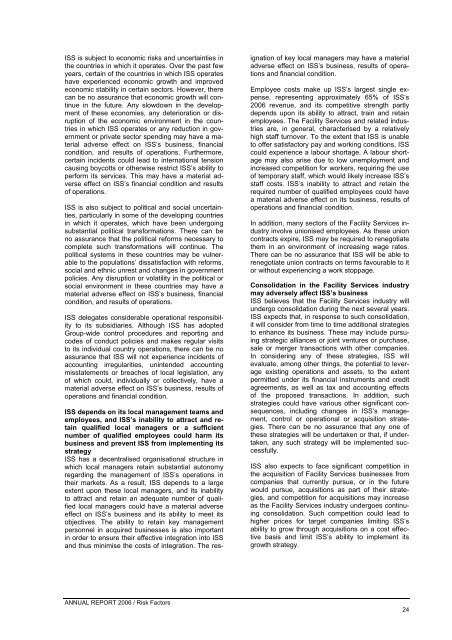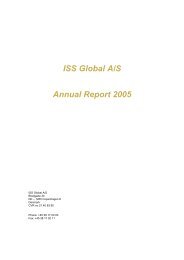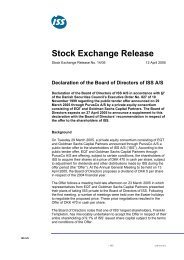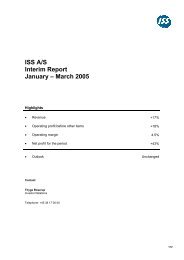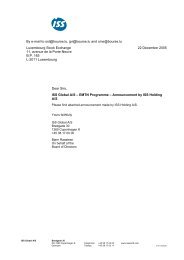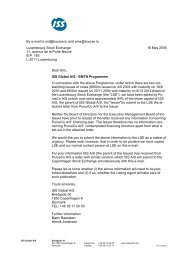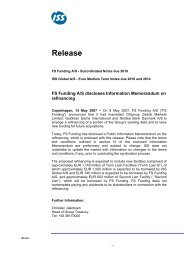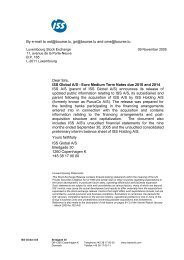Annual Report 2006 ISS Global A/S
Annual Report 2006 ISS Global A/S
Annual Report 2006 ISS Global A/S
You also want an ePaper? Increase the reach of your titles
YUMPU automatically turns print PDFs into web optimized ePapers that Google loves.
<strong>ISS</strong> is subject to economic risks and uncertainties in<br />
the countries in which it operates. Over the past few<br />
years, certain of the countries in which <strong>ISS</strong> operates<br />
have experienced economic growth and improved<br />
economic stability in certain sectors. However, there<br />
can be no assurance that economic growth will continue<br />
in the future. Any slowdown in the development<br />
of these economies, any deterioration or disruption<br />
of the economic environment in the countries<br />
in which <strong>ISS</strong> operates or any reduction in government<br />
or private sector spending may have a material<br />
adverse effect on <strong>ISS</strong>’s business, financial<br />
condition, and results of operations. Furthermore,<br />
certain incidents could lead to international tension<br />
causing boycotts or otherwise restrict <strong>ISS</strong>’s ability to<br />
perform its services. This may have a material adverse<br />
effect on <strong>ISS</strong>’s financial condition and results<br />
of operations.<br />
<strong>ISS</strong> is also subject to political and social uncertainties,<br />
particularly in some of the developing countries<br />
in which it operates, which have been undergoing<br />
substantial political transformations. There can be<br />
no assurance that the political reforms necessary to<br />
complete such transformations will continue. The<br />
political systems in these countries may be vulnerable<br />
to the populations’ dissatisfaction with reforms,<br />
social and ethnic unrest and changes in government<br />
policies. Any disruption or volatility in the political or<br />
social environment in these countries may have a<br />
material adverse effect on <strong>ISS</strong>’s business, financial<br />
condition, and results of operations.<br />
<strong>ISS</strong> delegates considerable operational responsibility<br />
to its subsidiaries. Although <strong>ISS</strong> has adopted<br />
Group-wide control procedures and reporting and<br />
codes of conduct policies and makes regular visits<br />
to its individual country operations, there can be no<br />
assurance that <strong>ISS</strong> will not experience incidents of<br />
accounting irregularities, unintended accounting<br />
misstatements or breaches of local legislation, any<br />
of which could, individually or collectively, have a<br />
material adverse effect on <strong>ISS</strong>’s business, results of<br />
operations and financial condition.<br />
<strong>ISS</strong> depends on its local management teams and<br />
employees, and <strong>ISS</strong>’s inability to attract and retain<br />
qualified local managers or a sufficient<br />
number of qualified employees could harm its<br />
business and prevent <strong>ISS</strong> from implementing its<br />
strategy<br />
<strong>ISS</strong> has a decentralised organisational structure in<br />
which local managers retain substantial autonomy<br />
regarding the management of <strong>ISS</strong>’s operations in<br />
their markets. As a result, <strong>ISS</strong> depends to a large<br />
extent upon these local managers, and its inability<br />
to attract and retain an adequate number of qualified<br />
local managers could have a material adverse<br />
effect on <strong>ISS</strong>’s business and its ability to meet its<br />
objectives. The ability to retain key management<br />
personnel in acquired businesses is also important<br />
in order to ensure their effective integration into <strong>ISS</strong><br />
and thus minimise the costs of integration. The res-<br />
ANNUAL REPORT <strong>2006</strong> / Risk Factors<br />
ignation of key local managers may have a material<br />
adverse effect on <strong>ISS</strong>’s business, results of operations<br />
and financial condition.<br />
Employee costs make up <strong>ISS</strong>’s largest single expense,<br />
representing approximately 65% of <strong>ISS</strong>’s<br />
<strong>2006</strong> revenue, and its competitive strength partly<br />
depends upon its ability to attract, train and retain<br />
employees. The Facility Services and related industries<br />
are, in general, characterised by a relatively<br />
high staff turnover. To the extent that <strong>ISS</strong> is unable<br />
to offer satisfactory pay and working conditions, <strong>ISS</strong><br />
could experience a labour shortage. A labour shortage<br />
may also arise due to low unemployment and<br />
increased competition for workers, requiring the use<br />
of temporary staff, which would likely increase <strong>ISS</strong>’s<br />
staff costs. <strong>ISS</strong>’s inability to attract and retain the<br />
required number of qualified employees could have<br />
a material adverse effect on its business, results of<br />
operations and financial condition.<br />
In addition, many sectors of the Facility Services industry<br />
involve unionised employees. As these union<br />
contracts expire, <strong>ISS</strong> may be required to renegotiate<br />
them in an environment of increasing wage rates.<br />
There can be no assurance that <strong>ISS</strong> will be able to<br />
renegotiate union contracts on terms favourable to it<br />
or without experiencing a work stoppage.<br />
Consolidation in the Facility Services industry<br />
may adversely affect <strong>ISS</strong>’s business<br />
<strong>ISS</strong> believes that the Facility Services industry will<br />
undergo consolidation during the next several years.<br />
<strong>ISS</strong> expects that, in response to such consolidation,<br />
it will consider from time to time additional strategies<br />
to enhance its business. These may include pursuing<br />
strategic alliances or joint ventures or purchase,<br />
sale or merger transactions with other companies.<br />
In considering any of these strategies, <strong>ISS</strong> will<br />
evaluate, among other things, the potential to leverage<br />
existing operations and assets, to the extent<br />
permitted under its financial instruments and credit<br />
agreements, as well as tax and accounting effects<br />
of the proposed transactions. In addition, such<br />
strategies could have various other significant consequences,<br />
including changes in <strong>ISS</strong>’s management,<br />
control or operational or acquisition strategies.<br />
There can be no assurance that any one of<br />
these strategies will be undertaken or that, if undertaken,<br />
any such strategy will be implemented successfully.<br />
<strong>ISS</strong> also expects to face significant competition in<br />
the acquisition of Facility Services businesses from<br />
companies that currently pursue, or in the future<br />
would pursue, acquisitions as part of their strategies,<br />
and competition for acquisitions may increase<br />
as the Facility Services industry undergoes continuing<br />
consolidation. Such competition could lead to<br />
higher prices for target companies limiting <strong>ISS</strong>’s<br />
ability to grow through acquisitions on a cost effective<br />
basis and limit <strong>ISS</strong>’s ability to implement its<br />
growth strategy.<br />
24


